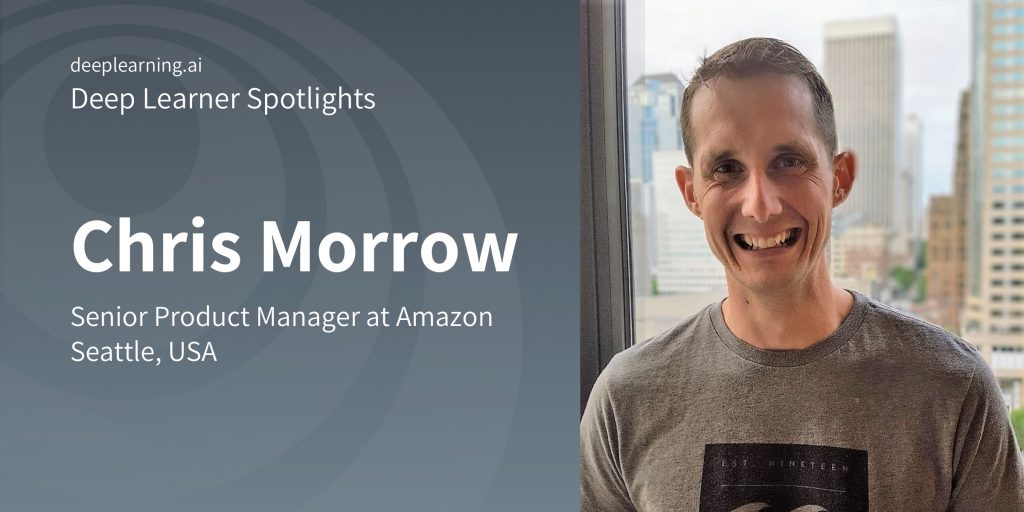Deep Learner Spotlight: Chris Morrow

Introduce yourself: What’s your background? Did you have a technical role prior to enrolling in the course?
I do not have a technical background. I spent about eight years as an Army Officer, leading small and mid-size reconnaissance units. My undergraduate degree is in International Affairs and I recently completed an MBA. I’ve always been very interested in technology and come from a family of engineers: my dad is a UX engineer, my sister is an SDE, and my brother is a mechanical engineer. I grew up curious, I’ve always loved taking things apart to figure out how they worked. The Army taught me how to learn quickly and how to ask technical experts to teach me on the job. I think this learning mindset helped me as I tried to figure out my next career step.
When I decided to transition to the private sector, I had a huge industry and function knowledge gap. Luckily, business school gave me the space to figure that out, and I landed my first internship at Xbox as an HR Manager Intern. Microsoft, like many tech companies, hosts internal demo days, and I attended one where the presenter discussed the current and future state of ML/DL. One hour later, I left convinced that ML/DL is the future and that I wanted to help create it. So I took more statistics classes (and realized that stats and data science are awesome), took the DL specialization, and eagerly read blogs, books, and forums. I also realized at the end of my internship at Xbox that Product Management was the ideal space for me. I think Product Management is the best of three worlds: people, process, and technology. I have the utmost respect for the engineers who build the products and empathy for the customers who buy them, so connecting the two is fun.
I’m certain that a foundational level of mathematics and statistics would be very useful in taking the course. For me, I realized that a post-MBA career pivot into starting over as an ML developer was not realistic. I now understand that my superpower is bridging the gap between the business, the customer, and AI/ML products. The course helped me build that knowledge set.
Why did you take the Deep Learning Specialization?
Going back to school for AI/ML wasn’t an option, so I resolved to start learning through deeplearning.ai.
I came into the specialization simply wanting to know more; I wanted to understand how it worked, tradeoffs, use cases; basically I wanted to know everything. As it turned out, the classes and the community would lead to a whole lot more.
What was your level of familiarity of deep learning before taking this course?
I’d heard about AI, but I had no understanding of how it worked or how it could be applied.
What did you find most valuable about the Deep Learning Specialization?
The first is that it allows me to proceed at my own pace, which is useful as other demands in my life ebb and flow. I also really like how it plugs you into a community of people who are interested in supporting your learning journey.
Have you continued to learn about deep learning after completing the specialization?
Yes, on a daily basis. After taking the courses, I wanted to learn more statistics, so I took several more statistics and analytics classes. I continue to read on my own about the field, and I follow industry developments closely. I also touch base regularly with several ML mentors at Amazon, where I now work.
What are you currently working on? How did the DL specialization help you get there?
My current position as a Product Manager of Technical Products at Amazon is a direct result of the DL specialization. During an interview, I was able to describe, in detail, how a prediction model works, how to select the data, how to train the model, and the use cases in which this model could add value to the customer. Feeling enough confidence to discuss machine learning with an experienced Amazon interviewer is a direct result of the DL Specialization.
In my current job, I am managing several large data warehouses, plus the analytics of the data we collect. Because of the specialization, I am continually looking for ways to implement AI or ML projects. I’ve identified several areas where we could apply ML, and now I am working on implementing these projects. I would not have been able to do this without the DL specialization and access to the community.
Anything else you’d like to share?
AI is such an exciting field to be active in. I am a visual, tactile learner. My favorite hobby is woodworking, I prefer to have a problem in front of me, so I can see all the pieces. I think this is what kept me away from technology for so long, being afraid I’d never grasp the concepts. Being interested in it gave me the perseverance to keep learning it, so I hope non-technical people who read this are encouraged to check it out. I’m happy to continue this conversation via LinkedIn or the forums!